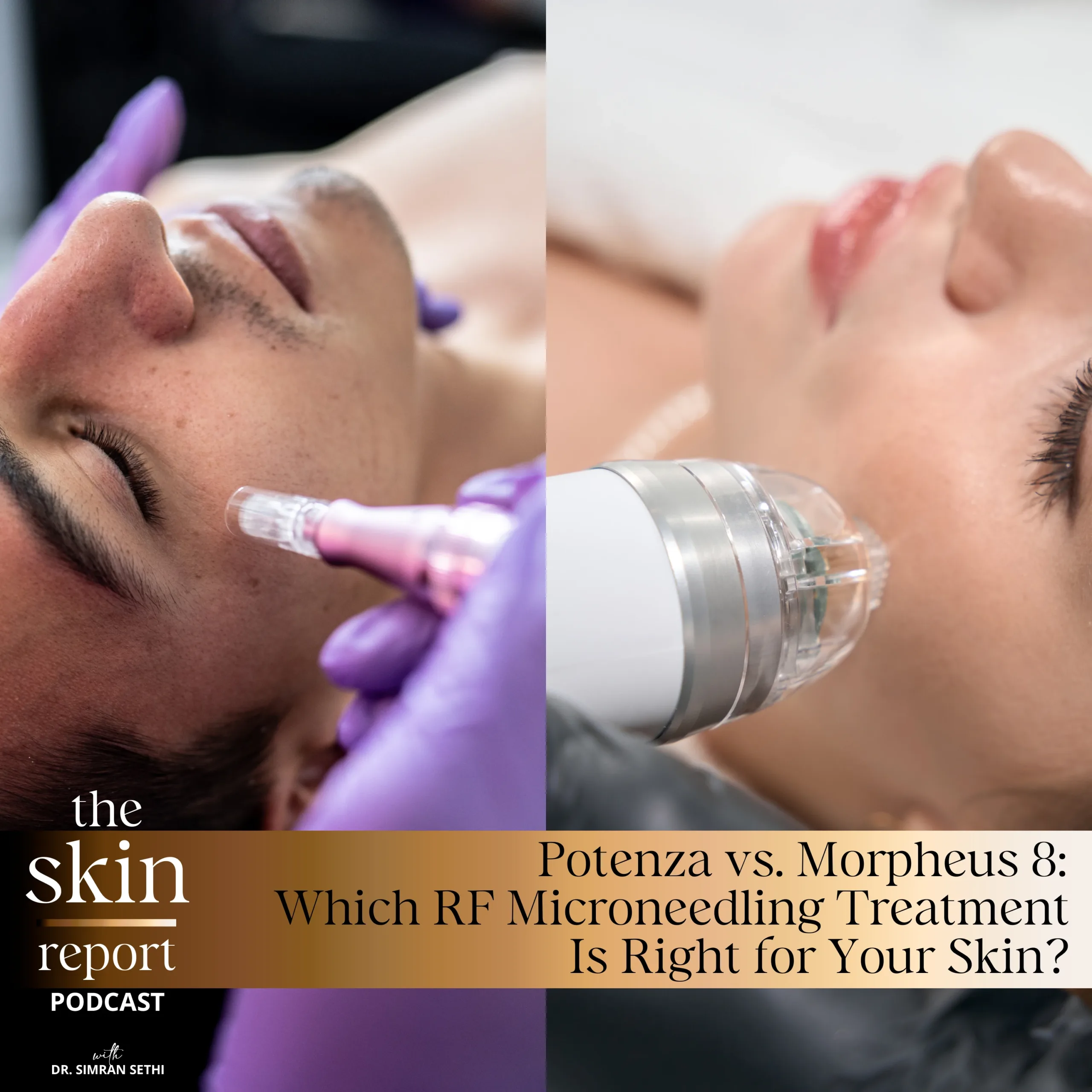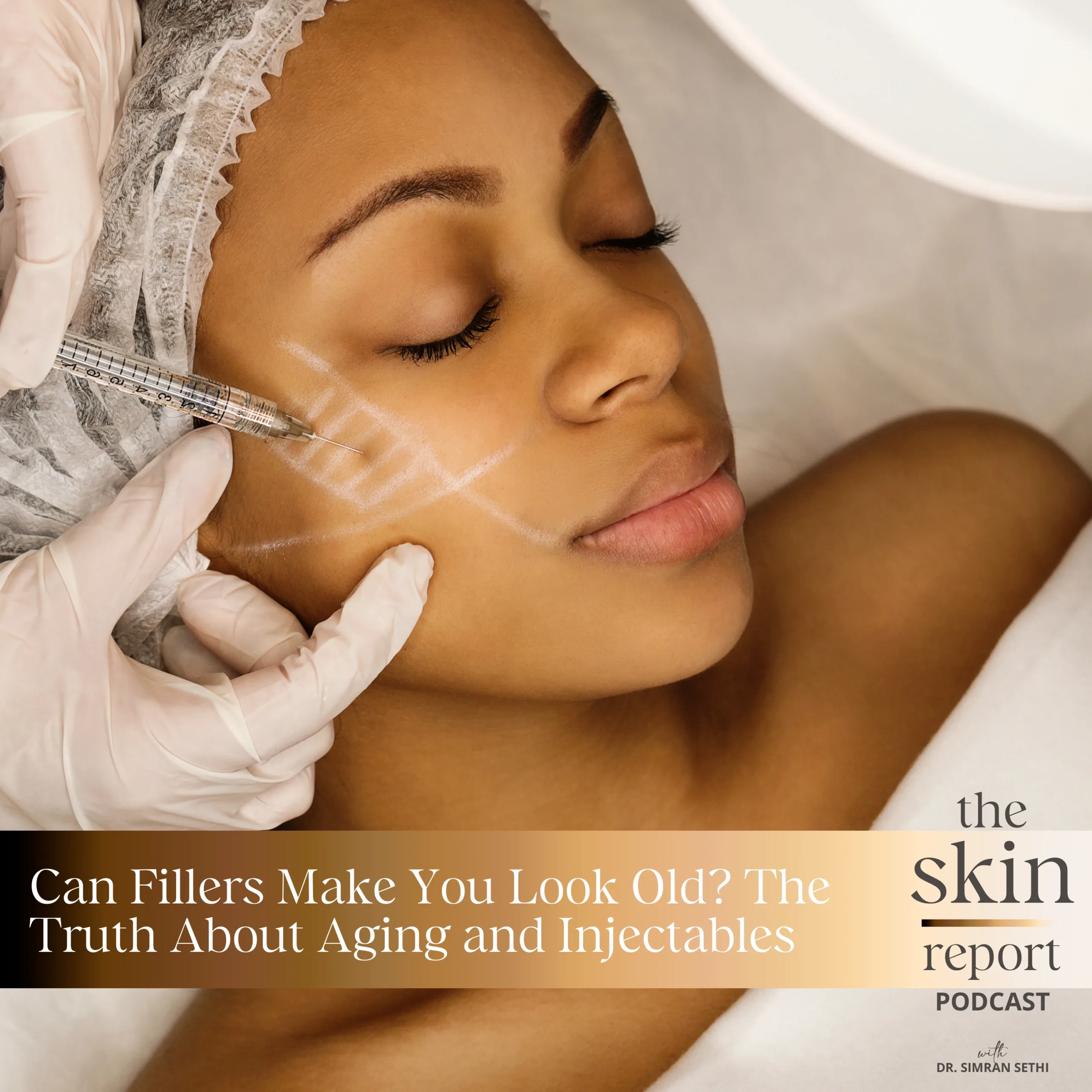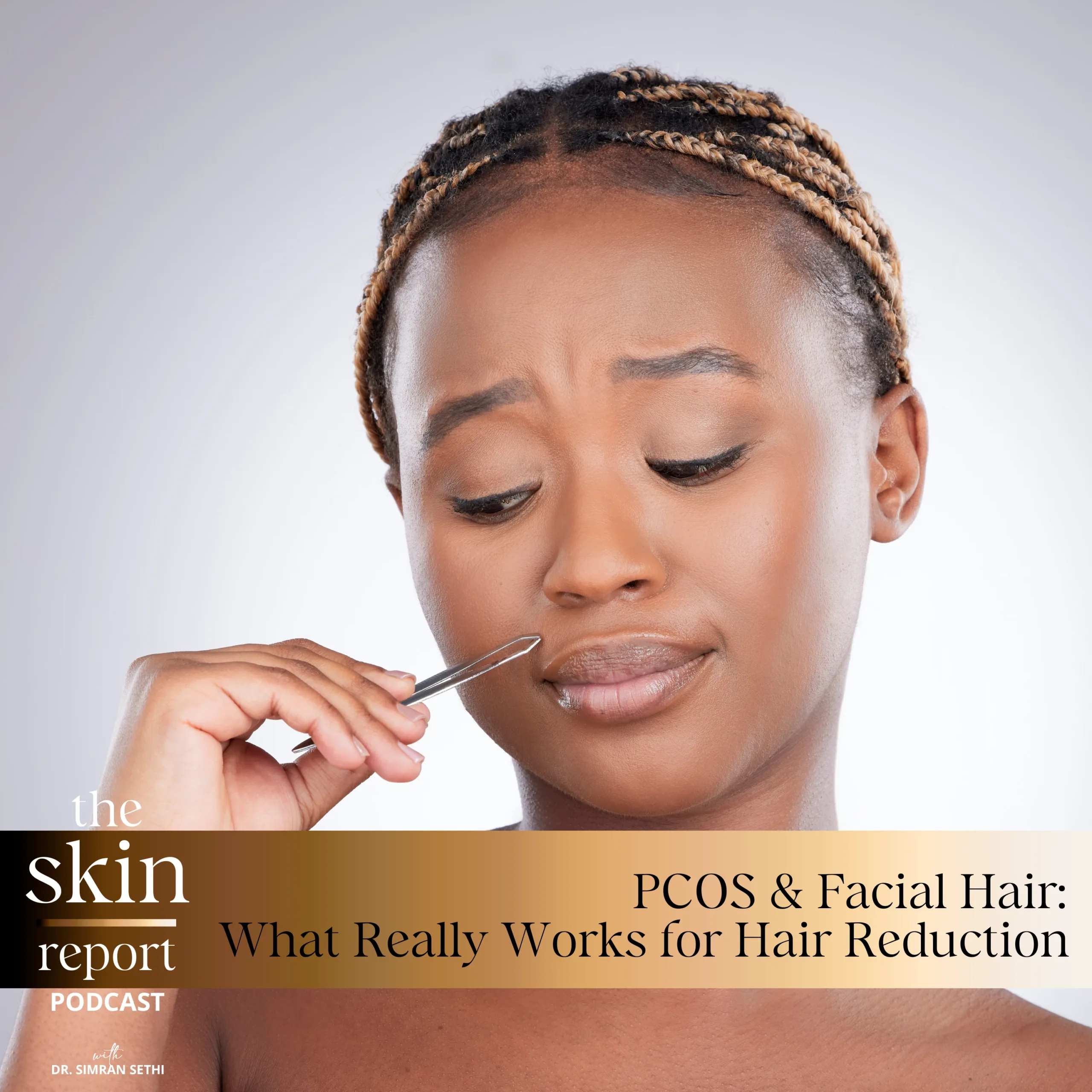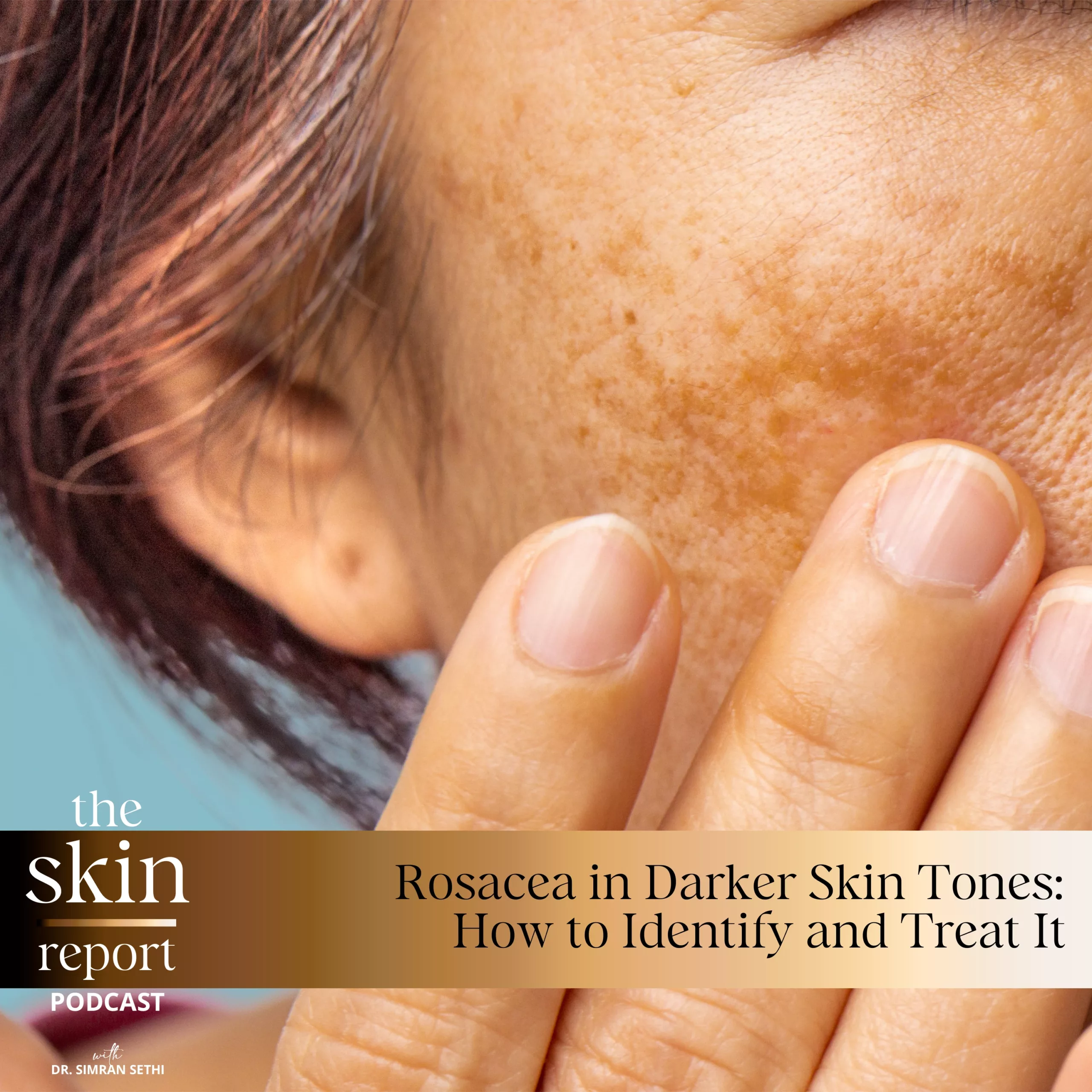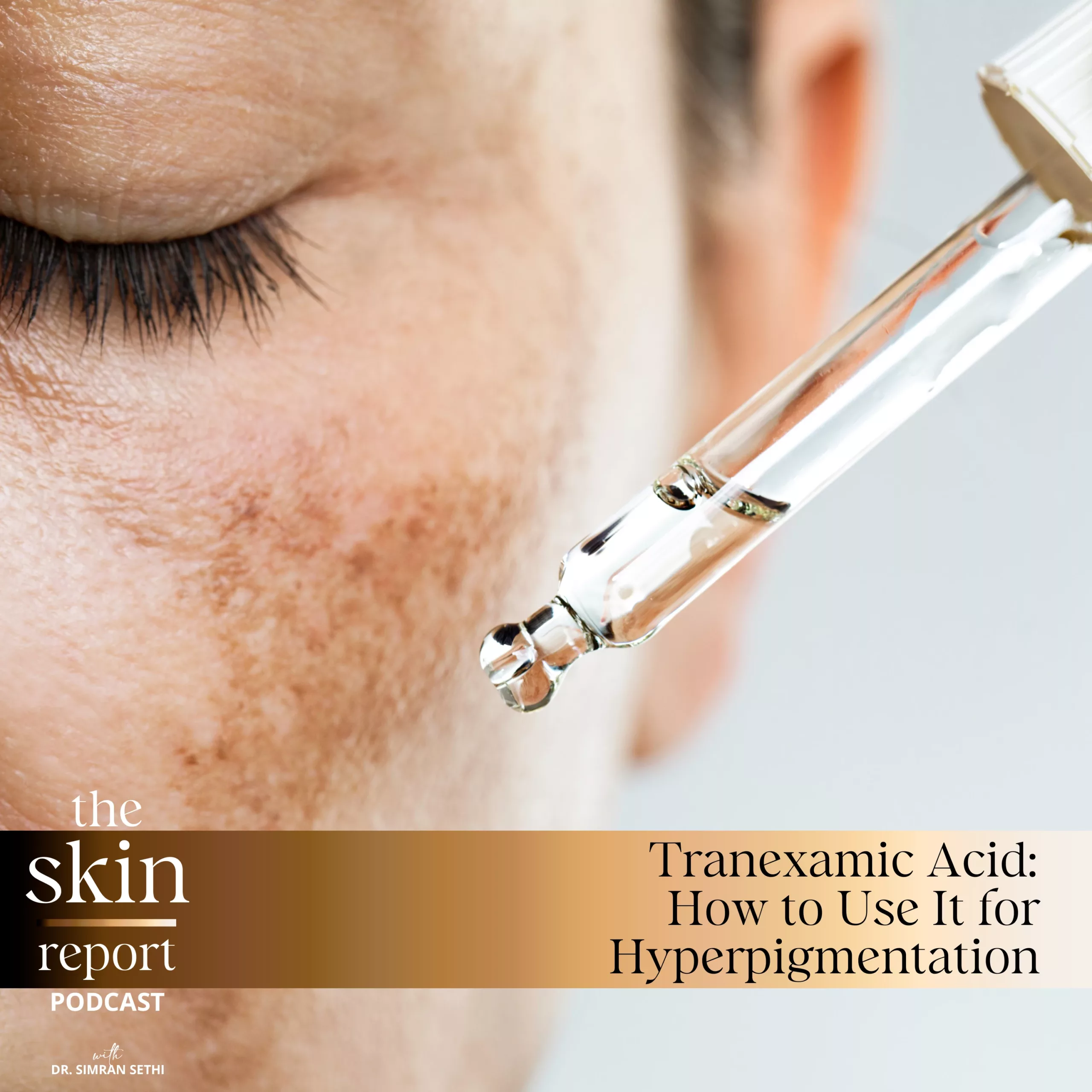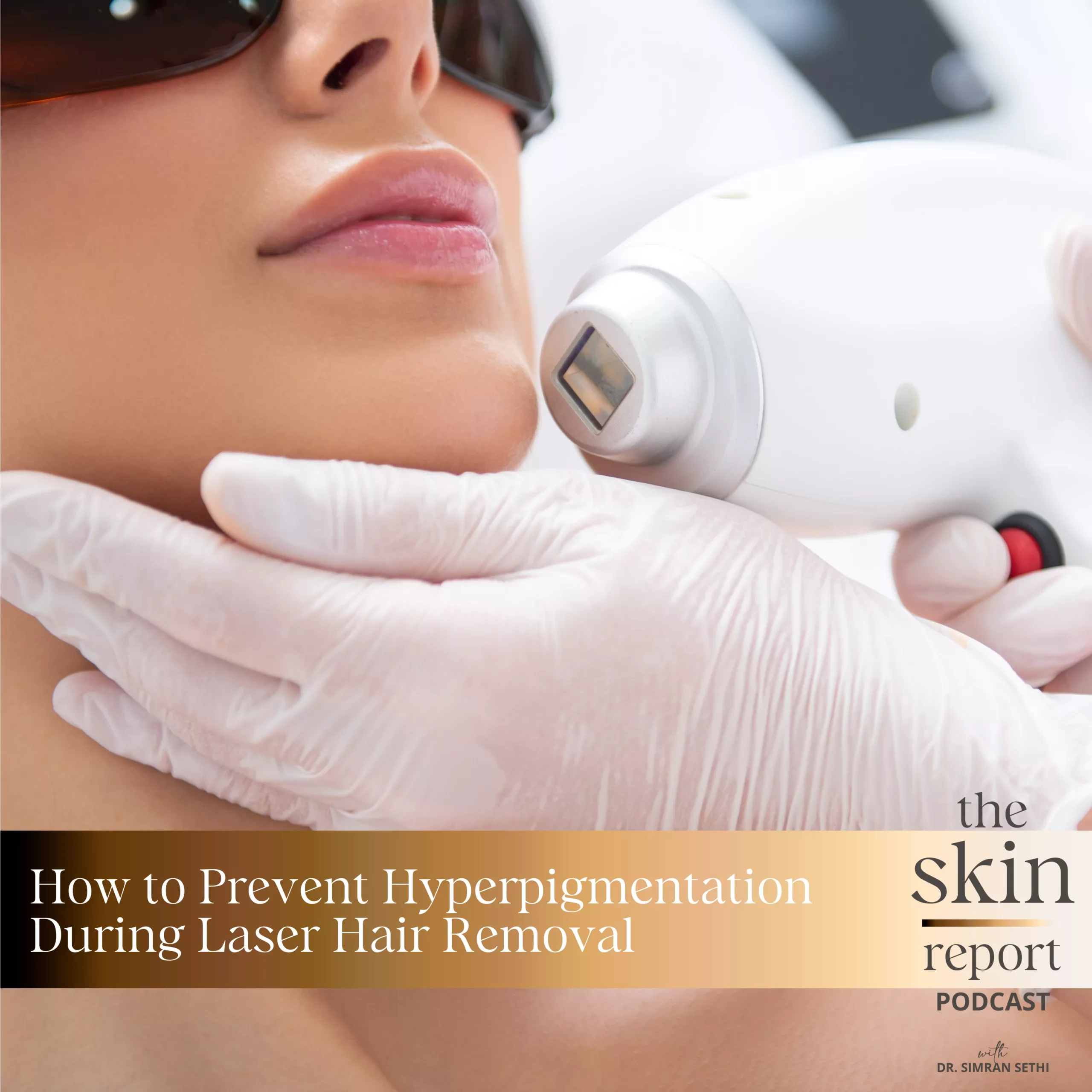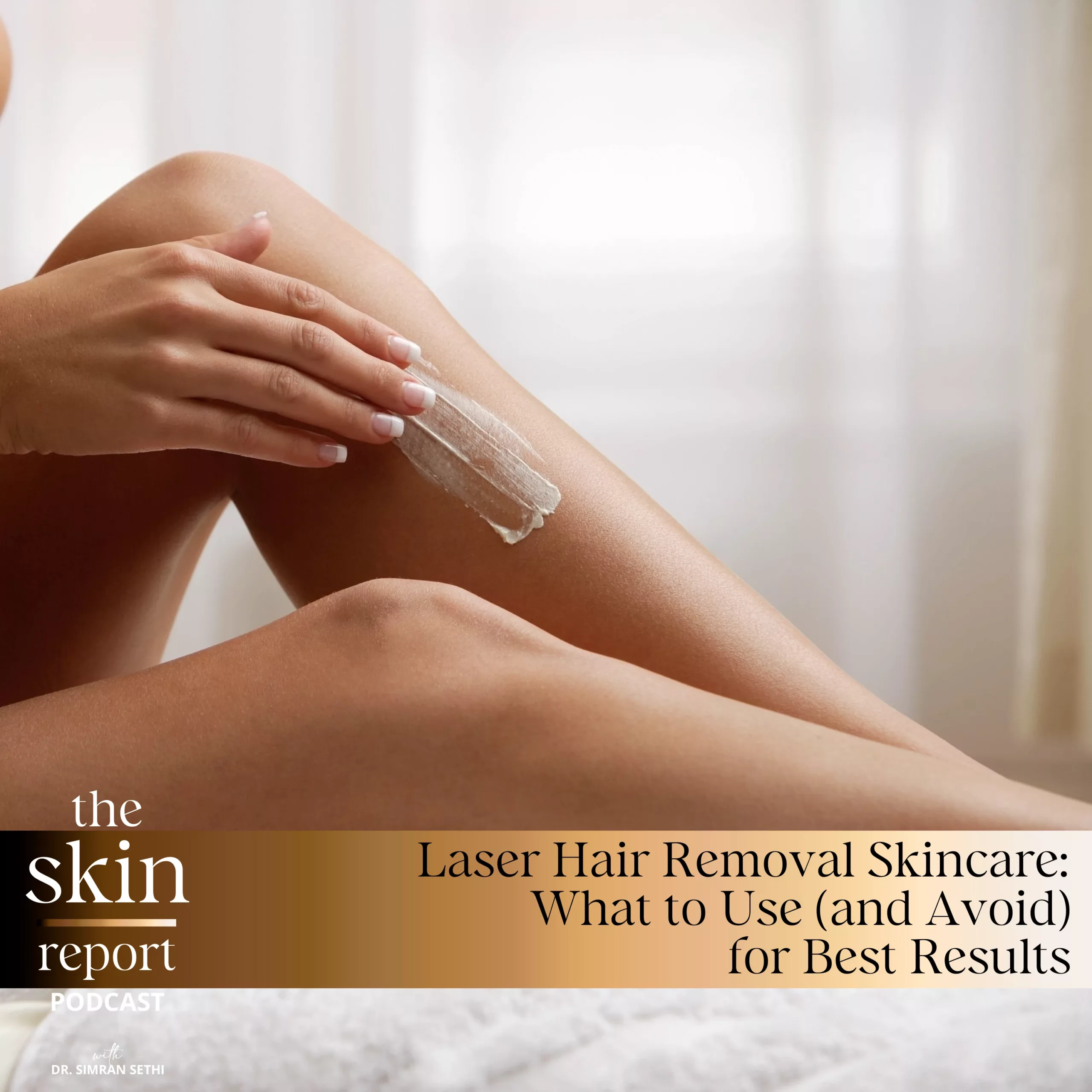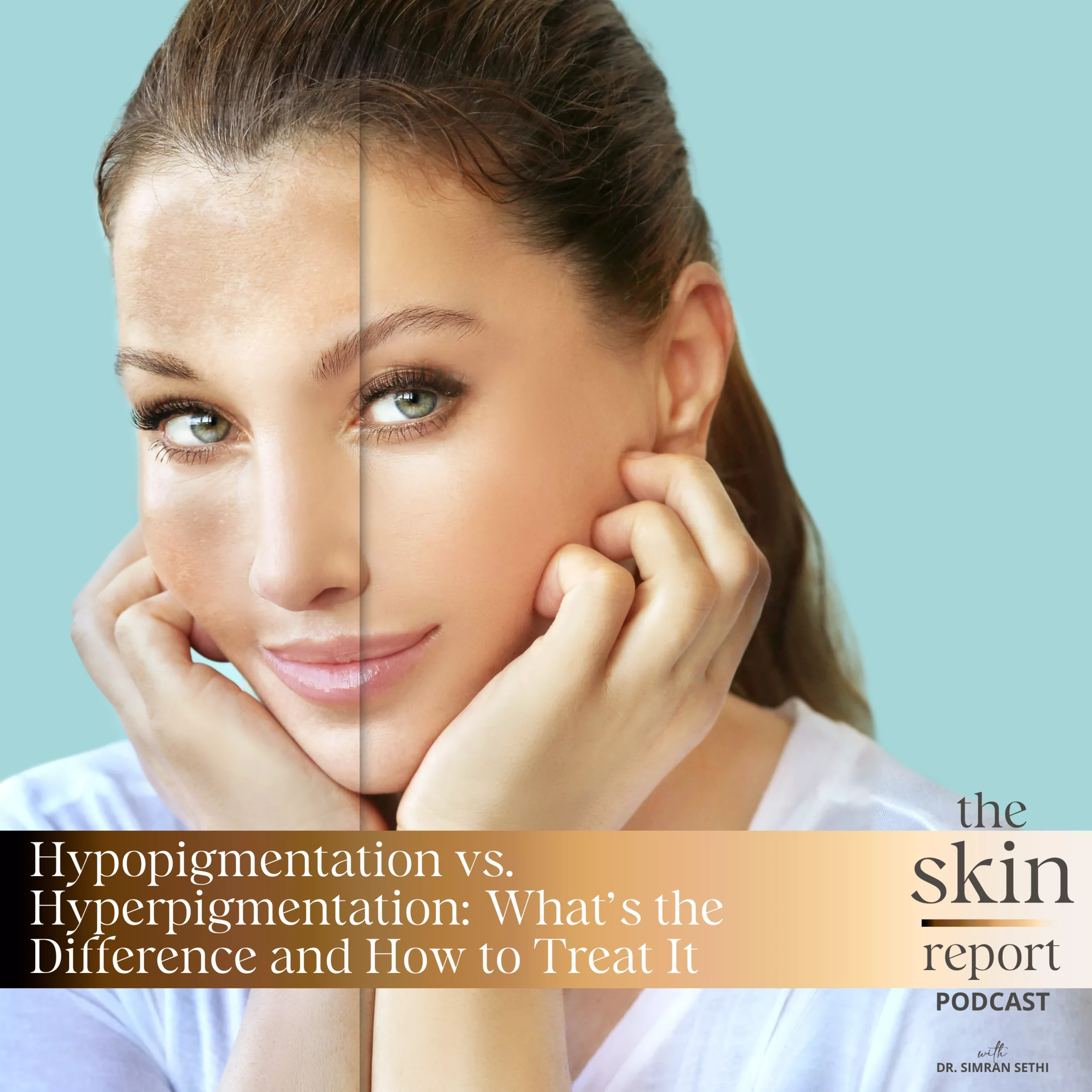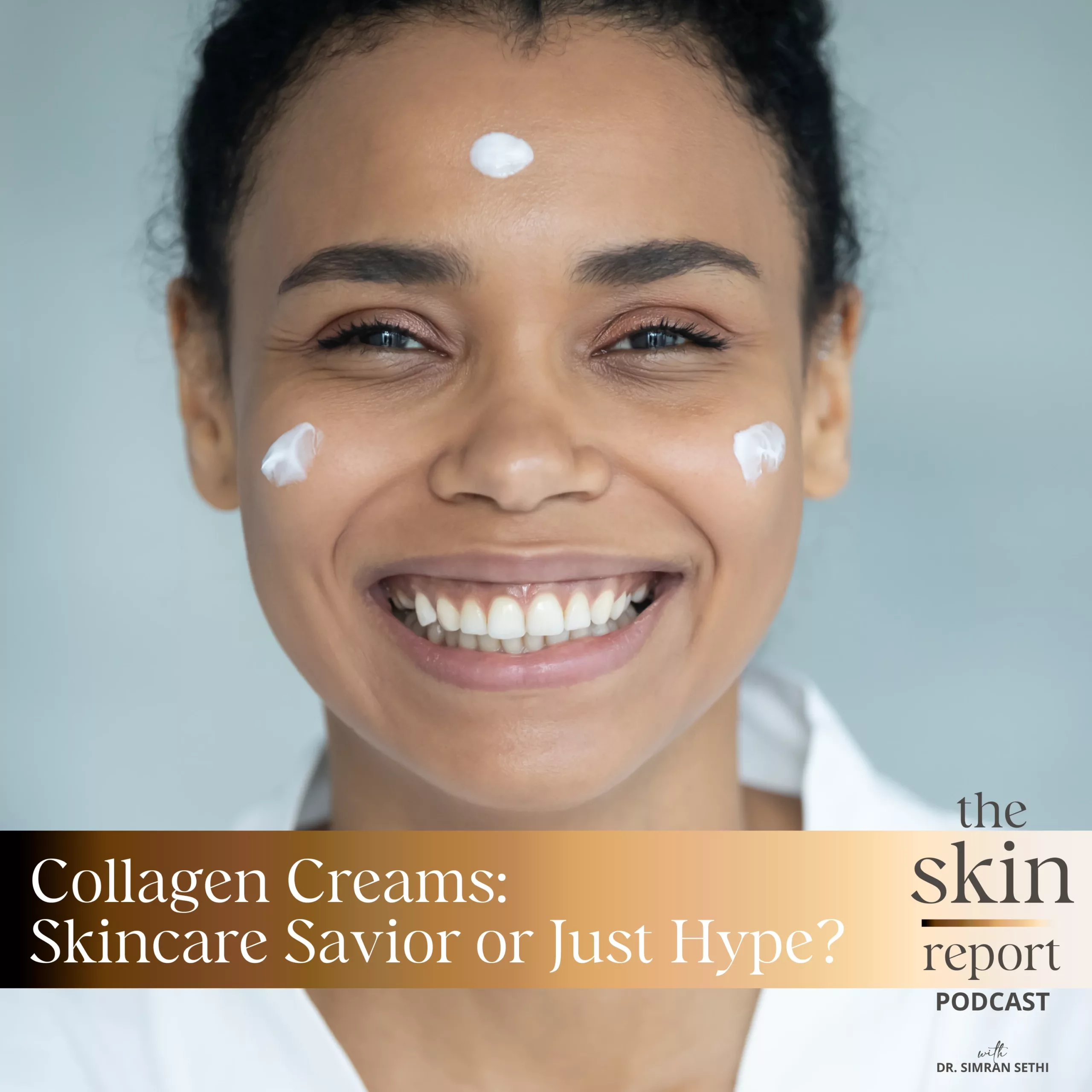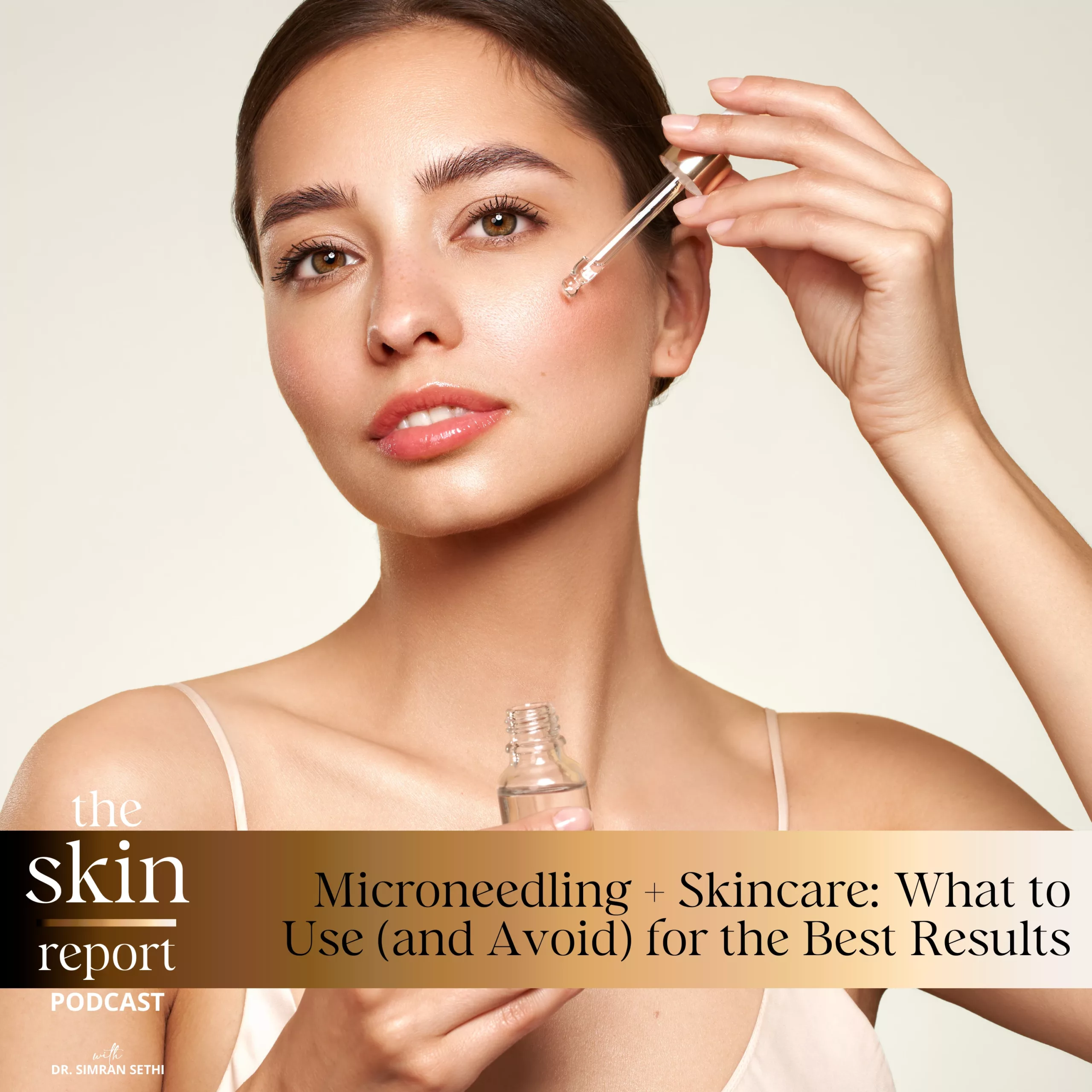Listener Question Series Part 2
How do you know if your acne is hormonal? Can adults get hormonal acne? Are eye creams a rip-off? What is snail mucin, and what are some alternatives? Are fragrances harmful in skincare? With new skincare trends circulating, many people form new questions about their skincare and skin health. This episode of The Skin Report will address these common questions by referencing the latest science-backed skincare facts!
The Skin Report is a podcast created to educate listeners on methods to improve skin health for people of all ethnicities and ages. On this episode, host Dr. Sethi answers more skincare questions that listeners are dying to know! This episode sheds light on hormonal acne, eye creams, fragrances in skincare formulations, and gentle products for adults. Additionally, Dr. Sethi tackles the latest Korean skincare ingredient to take the beauty world by storm – snail mucin!
As the founder of RenewMD Beauty Medical Spas and a woman of color, Dr. Sethi knows the importance of properly caring for your skin. So expand your skincare knowledge by tuning in to this informative episode! Also, follow on TikTok at @SkinByDrSethi for more skincare content!
Follow and DM a question for Dr. Sethi to answer on The Skin Report Podcast:
Renew Beauty Instagram:
https://www.instagram.com/renewmd_beauty/
RenewMD Beauty Medical Spas, California:
https://renewmdwellness.com/
Dr. Sethi on TikTok:
@SkinByDrSethi
Skin Cycling Duo Special Offer 20% off Promo Code:
SKINREPORT20
The Skin Report Season 1 Episode 4: Combating Adult Acne:
https://theskinreportbydrsethi.com/s1e4-combating-adult-acne/
This transcript was exported on May 9, 2023 -view latest version here.
Skincare can sometimes feel overwhelming, whether it’s finding the right products, ingredients, or treatments, there’s a lot out there, but not always for people of African, Hispanic, Middle Eastern and Eastern South Asian descent. That’s why I set out to educate myself and others so that we can all feel beautiful in our skin. Hello and welcome back to The Skin Report. I’m Dr. Simran Sethi, an internal medicine doctor, mom of three and CEO and founder of Skin by Dr. Sethi and RENewMD Medical Spas.
Today we’ll continue answering our top skin care questions from what I hear in my medical spa, our questions inbox and online, so let’s get started. The first question I want to answer has to do with something most, if not all of us have experience at some point in our life, acne. Acne doesn’t just plague teenagers, it can impact adults too. And in fact, we covered this exact topic in depth in season one, episode four of The Skin Report. I’ll include the link to that episode in the show notes, but for now, let’s get to the question which is, how do you know when acne is hormonal and how can you treat it?
Now, hormonal acne in teenagers is completely normal as their bodies are undergoing dramatic growth and hormonal shifts in both sexes. I say this because hormones do not need to be out of their normal range for acne to still be considered hormonal. Hormonal acne is also typically seen in later years, usually when men or women are in their ’20s and is caused by an imbalance between testosterone and estrogen. It can be a complex condition and is most common in women. Treating hormonal acne requires down regulating testosterone production and normalizing estrogen levels. This can be achieved by a variety of interventions depending on the symptoms and severity. So how would I approach treating hormonal acne? Hormonal acne unfortunately cannot just be treated with skincare and skin treatments. I know this sounds discouraging, but that doesn’t mean there aren’t solutions. Skincare and skin treatments will definitely help to reduce scars and hyperpigmentation as seen in darker skin tones that are left behind after the acne has resolved.
However, we do need to first tackle the stimulus behind the excess acne production, which are hormones. Depending on what the patient is experiencing alongside their acne, I would take different approaches. Let’s run through them. If a woman has excessive acne in their ’20s or later and has abnormal menstruation, I would first try oral contraceptive pills. If she has normal periods, then I would prescribe an oral medication called spironolactone. This is a safe medication used for heart health and multiple other conditions and very effectively to treat hormonal acne. If a woman has excess and thick facial hair growth and acne, I will start her on spironolactone and may add oral contraceptives if it doesn’t clear within a few months. I also want to say that you don’t have to be on these medications forever. After using them for a year or two, you can stop because your hormones would’ve also shifted.
This is important to note because a common misconception is that once you’re put on oral medications for hormonal acne, you can never stop. Hormonal acne is common in PCOS, polycystic ovarian syndrome, but is not always caused by it. Regardless, the same interventions are very effective. If you have a darker skin tone, treating your hormonal acne early is very, very, very important as this skin type tends to form permanent scars and hyperpigmentation extremely easily. The sooner you treat it, the less the chances of that happening are. PCOS is also more common in women of South Asian descent, which is why we commonly encounter hormonal acne in these young women. Now, when we return, we’ll examine eye creams, a new ingredient in western skincare and more.
Have you heard that eye creams are a ripoff? Can I apply just regular moisturizer under my eyes? Eye creams are essential and most certainly not a ripoff. The skin around our eyes is very different from the skin on our face and body. To understand this, first lift the skin under your eyes and then compare that to the skin on your forehead or cheeks. The skin around our eyes is easy to see through as it’s significantly thinner. This is also why the skin around the eyes shows the first signs of aging. To help prevent and slow this down look for ingredients that promote collagen, skin cell turnover and protection from UV and blue light. Yes, this is very similar to the rest of our face, but for the skin around the eyes, you need ingredients that easily penetrate into the skin without irritating it, while being potent, high concentration. So what ingredients should you look for?
For collagen promotion, I do not recommend L-ascorbic acid, vitamin C serums around the eyes. These are very acidic and can easily break the thin skin barrier around the eyes. Instead, use a THD vitamin C and/or collagen building peptides that can all be found in formulations that are close to the skin’s pH and don’t run any risk of breaking the skin barrier. I’m a fan of using retinol around the eyes, but you have to be careful about the concentration and formulation. Never use tretinoin or Retin-A around the eyes because these are way too strong and will break your skin barrier. My line’s Retinal Lipid Complex is a medium strength 0.5% retinal formulation in lipids to fortify the skin barrier. It can easily be used around the eyes where it’s essential in repairing all the damage that this thin layer of skin undergoes. Another factor to consider is blue light. Digital pollution breaks down the proteins and skin around the eyes, as the skin is thin to begin with, and as we spend a lot of time in front of screens, this can increase the aging process.
However, blue light protection can come from a variety of compounds like winter cherry extract or marine algae. An ingredient like this can help protect the skin around the eyes from blue light further breaking down collagen. Even though the under eyes don’t take up much surface area ingredients in eye cream need to be very concentrated. If we just use the same products as the rest of the face, we may not deliver enough dose of key nourishing ingredients to the area. The next question I want to answer is less common, but I think it will begin to trend and will be something you soon see everywhere. I want to talk about snail mucin. Where does it come from and how does it work in skincare? Snail mucin was introduced to us more recently through Korean beauty brands, but scientific research shows that even the ancient Greeks used it for its skin healing properties.
Snails extrude mucin when they’re stressed to help protect the snail from injury, which is why these mucins contain collagen building and skin barrier protection factors. I think snail mucin is not just hype, but a proven way to promote healthy and hydrated skin. While all of this may sound bizarre, it’s not so different from the foundation and the mechanisms of action in our current medical aesthetics. Every skin procedure, like laser resurfacing or microneedling is performed to create a controlled injury and stress the skin to trigger an accelerated new skin building response. The snail is doing this to some extent. We are then taking the substance it secretes because of the stress response and applying it to our skin. Not only is it incredibly hydrating, it can also be used in any skin type. Though snail mucins haven’t been shown to negatively impact certain skin types, it’s important to find a product free of dyes, parabens, or added fragrances.
It’s also important to note that snails are not necessarily harmed to make them secrete snail mucin, but they are stressed to do so. If you’re vegan, snail mucin is not vegan friendly, and while there are not any vegan friendly snail mucin products, there are numerous alternatives that deliver the same benefits of snail mucin. My line includes alternatives like the Ultra Glow Moisturizer or the Hyaluronic Plump and Protect to deliver similar benefits while staying vegan. Before we wrap up today’s episode, I want to talk about something that I feel has only recently entered discussions around skincare, and that is fragrance. Are fragrances in products okay? Should they be there? What is their purpose? The truth of the matter is this, I do not agree with adding any synthetic fragrances to skincare products no matter if they’re going on your face or body. Synthetic fragrances are artificial perfumes that are used to make skincare products smell better.
It’s not easy to create products with effective active ingredients and make the product naturally smell appealing. Synthetic fragrances have been repeatedly shown to be allergens for so many and adding them to the delicate skin on our face no matter how healthy our skin is, has the potential to create inflammation or allergies. People with eczema are especially prone to developing reaction to skincare products that contains synthetic fragrances. Manufacturers will mix in synthetic fragrances to neutralize a product smell or make it more appealing. The process is cheaper and quicker than utilizing ingredients with natural fragrance. It’s not that all our products need to lack smell. Products can be developed to smell neutral or naturally fragrant by developing formulations that contain natural botanical fragrance, but this process is often lengthy and more expensive.I know this firsthand because all the products in my line were developed with a lot of formulation, experimentation to produce an effective formulation which smells neutral or like the botanical ingredients in it without using any synthetic fragrances.
This was a long and expensive process, but the result is a line that does not contain any allergens, which is why I can count on one hand the number of people who have had a reaction through the products amongst thousands of users. I also think that because of the use of synthetic fragrances in products, many believe that they should use gentle products like Cetaphil or CeraVe or baby brands and decide to do so indefinitely. If you’re an adult, you should not use skincare for babies clearly. This is such a misconception and I see it so commonly amongst people of color. People of color tend to show allergies to fragrances quickly, and this again appears as hyperpigmentation on their skin. Baby products are gentle, but they do not contain any active ingredients to build stronger, younger skin, think skin barrier building, cell turnover and protection. We are so, so, so, so lucky to live at a time when dermatological research has introduced excellent products into the market to correct skin concerns and if delivered in safe and fragrance-free formulations, this can do wonders on our skin.
I frequently encounter patients who are scared to try medical grade skincare brands like mine because they had a reaction to skincare products that they purchased over the counter or online, and now believe that they can only use extremely gentle formulations that are designed for children. This is absolutely not true, and once they try my line, which is fragrance, parabens and dye-free, they’re surprised that they can use potent medical grade products like Retinol, vitamin C and many others without any issues. All the products in my line smell pleasant because of the ingredients they contain and not synthetic fragrances. These natural ingredients also go through a long process that distills, cold presses and extracts essential oils from plants to retain the natural aroma of the plant-based ingredients used in the skincare line. This is not just true of my skincare line, but really any reputable line that excludes fragrances, dyes and parabens.
However, when you look for this, you may be surprised to see how many popular and reputable brands actually use synthetic fragrances in their products. When it comes to synthetic fragrances, they have no place in your skin or body care, so be a smart consumer and read your labels carefully. I hope you enjoyed our listener question series. If you’d like more of this content, let us know. We are a woman of color owned brand and any likes, reviews, ratings and shares truly help to boost the podcast and get it in front of others like yourself. Thanks for listening, and until next time, love the skin you’re in and celebrate your beauty.
If you’d like to learn more about science backed skincare or medical aesthetic treatments, please subscribe to and turn our notifications for The Skin Report so you always know when a new episode is up. We have a newsletter that you can sign up for on skinbydrsethi.com, so that you can stay up to date on all our latest podcasts and more. Additionally, if you have a skincare question or want to make an episode topic recommendation, please message me at theskinreportbydrsethi.com, which is linked in my show notes, and I’ll be sure to answer your question in an episode soon. We’ve received some great questions so far and I will try and answer them at the end of every episode, so keep them coming.
Transcript by Rev.com


